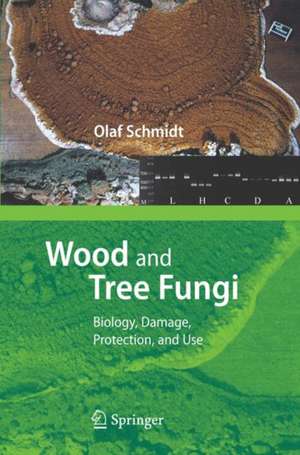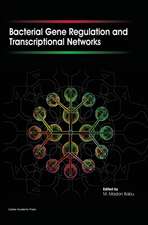Wood and Tree Fungi: Biology, Damage, Protection, and Use
Autor Olaf Schmidten Limba Engleză Hardback – 8 mai 2006
A book providing an overview of the various wood and tree fungi that damage trees, lumber, and timber. Special focus is given to identification, prevention, and remediation techniques, and the book bridges the gap between research and application.
| Toate formatele și edițiile | Preț | Express |
|---|---|---|
| Paperback (1) | 564.62 lei 3-5 săpt. | +23.71 lei 10-14 zile |
| Springer Berlin, Heidelberg – 14 oct 2010 | 564.62 lei 3-5 săpt. | +23.71 lei 10-14 zile |
| Hardback (1) | 790.57 lei 6-8 săpt. | |
| Springer Berlin, Heidelberg – 8 mai 2006 | 790.57 lei 6-8 săpt. |
Preț: 790.57 lei
Preț vechi: 964.10 lei
-18% Nou
Puncte Express: 1186
Preț estimativ în valută:
151.27€ • 158.37$ • 125.17£
151.27€ • 158.37$ • 125.17£
Carte tipărită la comandă
Livrare economică 05-19 aprilie
Preluare comenzi: 021 569.72.76
Specificații
ISBN-13: 9783540321385
ISBN-10: 3540321381
Pagini: 334
Ilustrații: XII, 336 p.
Dimensiuni: 155 x 235 x 25 mm
Greutate: 0.69 kg
Ediția:2006
Editura: Springer Berlin, Heidelberg
Colecția Springer
Locul publicării:Berlin, Heidelberg, Germany
ISBN-10: 3540321381
Pagini: 334
Ilustrații: XII, 336 p.
Dimensiuni: 155 x 235 x 25 mm
Greutate: 0.69 kg
Ediția:2006
Editura: Springer Berlin, Heidelberg
Colecția Springer
Locul publicării:Berlin, Heidelberg, Germany
Public țintă
Professional/practitionerCuprins
Introduction.- Biology. Cytology and Morphology. Growth and Spreading. Sexuality Identification. Classification.- Physiology. Nutrients. Air. Wood Moisture. Temperature. pH Value and Acid Production. Light and Force of Gravity. Restrictions of Physiological Data. Competition and Interactions Between Organisms.- Wood Degradation. Enzymes and Low Molecular Agents. Pectin Degradation. Degradation of Hemicelluloses. Cellulose Degradation. Lignin Degradation.- Damage by Viruses and Bacteria. Viruses. Bacteria.- Wood Discoloration. Molding. Blue Stain. Red Streaking. Protection.- Wood Rot. Brown Rot. White Rot. Soft Rot. Protection.- Habitat of Wood Fungi. Fungal Damage to Living Trees. Tree Wounds and Tree Care. Tree Rots by Macrofungi. Damage to Stored Wood and Structural Timber Outdoors. Damage to Structural Timber Indoors.- Positive Effects of Wood-inhabiting Microorganisms. 'Myco-Wood'. Cultivation of Edible Mushrooms. Biological Pulping. 'Palo Podrido' and 'Myco-Fodder'. Wood Saccharification and Sulphite Pulping. Grinding and Steam Explosion. Recent Biotechnological Processes with Lignocelluloses and Outlook.- Appendix. Key for Strand-Forming House-Rot Fungi. Fungi Mentioned in this Book.
Recenzii
From the reviews:
"The book (334 pages) is an updated revision of the German edition ‘Holdz-und Baumpilze’ from 1994. … The book is illustrated with 74 figures (12 coloured pictures) and 49 tables. … The book is of great interest to scientists, students, professionals working in wood protection, as well as foresters." (Benoit Marçais, Annals of Forest, Vol. 63 (2), 2007)
"The book (334 pages) is an updated revision of the German edition ‘Holdz-und Baumpilze’ from 1994. … The book is illustrated with 74 figures (12 coloured pictures) and 49 tables. … The book is of great interest to scientists, students, professionals working in wood protection, as well as foresters." (Benoit Marçais, Annals of Forest, Vol. 63 (2), 2007)
Textul de pe ultima copertă
"Wood and Tree Fungi" provides an up-to-date overview of the various wood and tree fungi that damage trees, lumber, and timber, with special focus given to identification, prevention, and remediation techniques.
First, the fundamentals of cytology and morphology, growth and reproduction, formal genetics, and enzymatic wood decay are addressed. Causative factors are then analyzed, followed by descriptions of interactions like antagonism, succession, and mycorrhiza.
The more practical section describes damages by viruses on trees and by bacteria on the xylem of trees and on structural timber, wood discoloration caused by molds and stain fungi, wood decays by rot fungi, and preservation methods. The habitats of wood fungi are described as well as tree care. Important tree pathogens and wood decay fungi are characterized for prevention and identification.
The final section focuses on the positive effects of wood-inhabiting microorganisms, covering past and classical methods like myco-wood, mushroom cultivation, biological pulping, and "palo podrido", as well as recent biotechnological processes.
First, the fundamentals of cytology and morphology, growth and reproduction, formal genetics, and enzymatic wood decay are addressed. Causative factors are then analyzed, followed by descriptions of interactions like antagonism, succession, and mycorrhiza.
The more practical section describes damages by viruses on trees and by bacteria on the xylem of trees and on structural timber, wood discoloration caused by molds and stain fungi, wood decays by rot fungi, and preservation methods. The habitats of wood fungi are described as well as tree care. Important tree pathogens and wood decay fungi are characterized for prevention and identification.
The final section focuses on the positive effects of wood-inhabiting microorganisms, covering past and classical methods like myco-wood, mushroom cultivation, biological pulping, and "palo podrido", as well as recent biotechnological processes.
Caracteristici
Bridges the gap between research and application Includes supplementary material: sn.pub/extras










